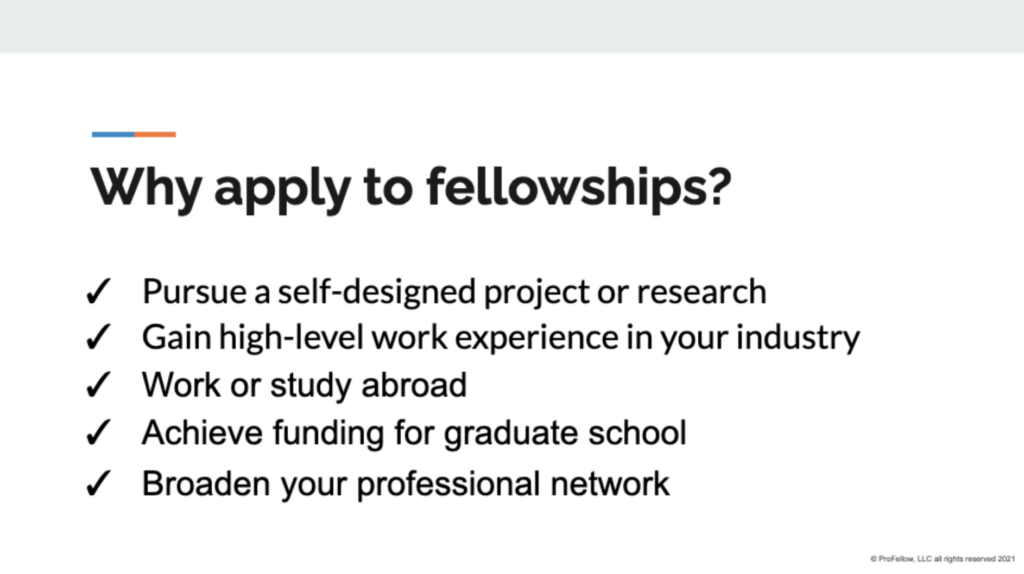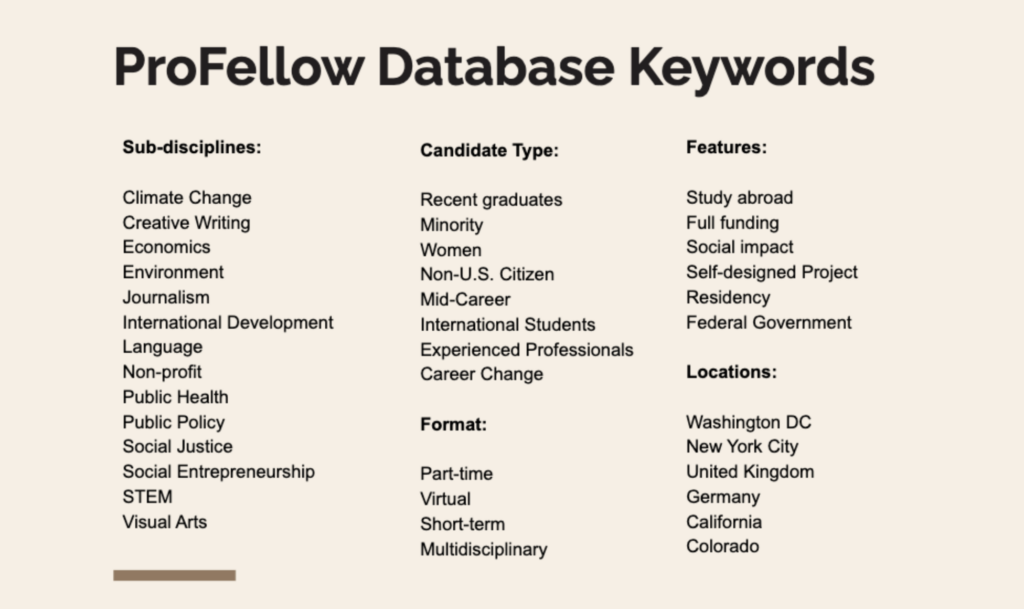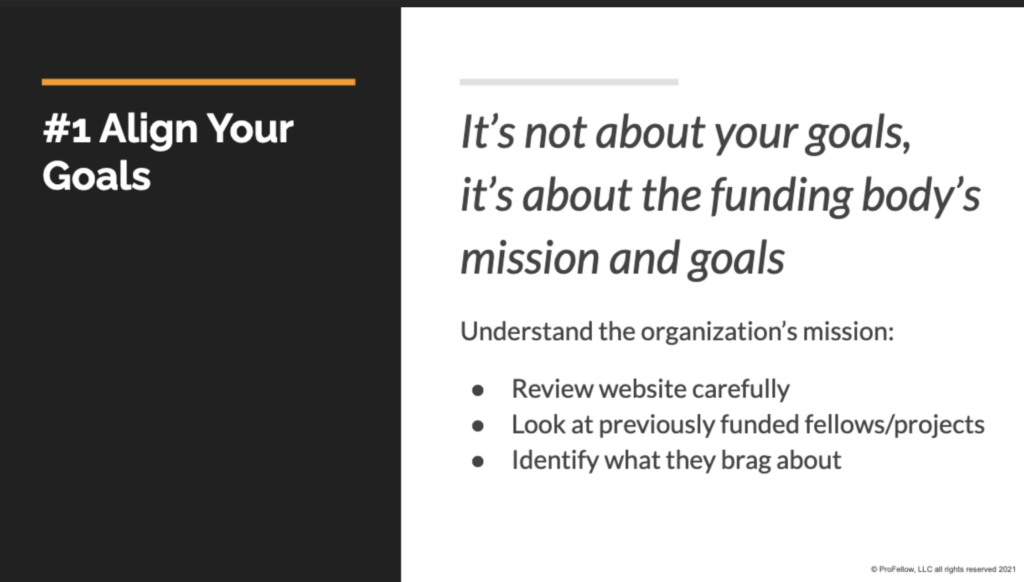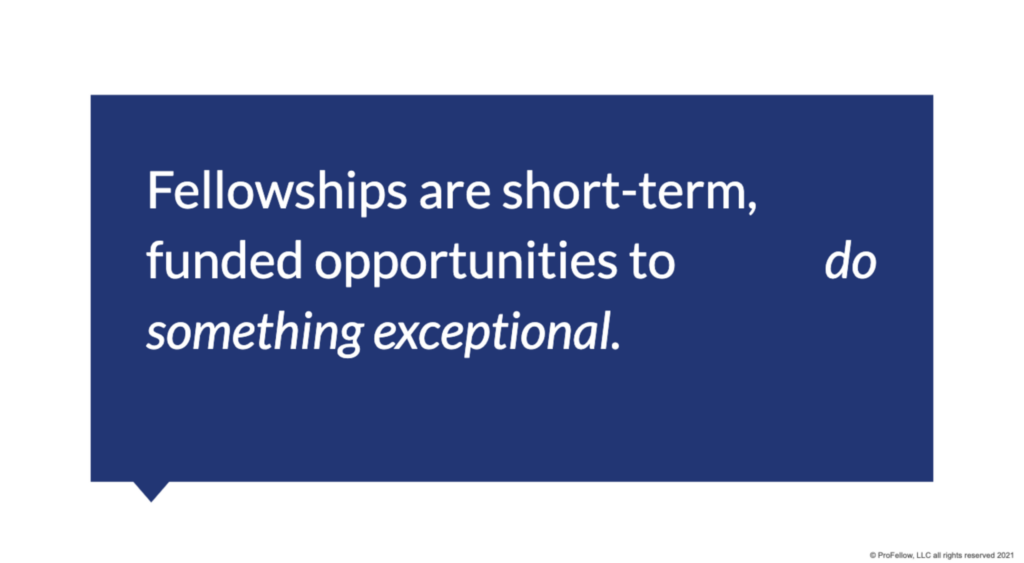ProFellow Founder Dr. Vicki Johnson recently gave a workshop on how to use the free ProFellow database to find a wide range of fellowships that will help you achieve your career goals.
In this video, Dr. Vicki Johnson covers fellowships for early and mid-career professionals, international study and research, creative arts projects and residencies, graduate school funding, and more. There are fellowships for all disciplines of work and study, including government (federal, international, and local), racial equity, women’s rights, environmental sustainability, entrepreneurship, arts, law, history, writing, technology, agriculture, computer science, psychology, STEM, teaching, and many more. You can watch the full replay of the workshop in the video above!
Create a ProFellow account to get started! (Video 5:52)
To access the free ProFellow database, you must create an account. Our social impact mission is to help you find awards. When you create a free account with ProFellow, we do not share or sell your information to any third parties, including fellowship organizations. This is only used for your account.
There are great fellowship organizations looking for people just like you. If you sign up for our mailing list, we send you fellowships that match your background, you receive our popular weekly newsletter with new awards, trending articles, and great events like this. A benefit to signing up for the database is to access the database to find and bookmark fellowships that you can save.
If you created a ProFellow account many years ago, I also encourage you to log in and update your profile because your information and interests may have changed. Maybe there was a time you were looking for undergraduate fellowships and now you’re looking for professional fellowships. Make sure you update your ProFellow profile so that we can send you awards that are matching what you’re interested in currently.
In addition, check out the full ProFellow website. We do articles on application tips, interviews with previous fellows about their experience, and more! We have lots of resources and interesting content.
What are Fellowships? (Video 8:01)
We call fellowships short-term funded opportunities to do something exceptional. All types of fellowships are time-limited in nature. They can be anywhere from a couple of weeks to a couple of years in length. A common length for a fellowship is one year.
We call fellowships funded opportunities. There are fellowships that are not funded but in our database, we only list opportunities that offer funding in the form of a stipend, grant, travel reimbursements, or funding for the opportunity itself. For the awards that are listed in our database, you should not have to pay money out of pocket to participate in a fellowship.
And third, we say, do something exceptional. Essentially, all fellowships are merit-based. These fellowships are not scholarships for financial need, like you see at the undergraduate level. A lot of these fellowships are looking for people who are working in specific areas. They’re looking for people who are working hard and striving to do specific types of projects. If you are somebody that is a hard worker or a high achiever, a fellowship could be a great opportunity for you to advance your career or find funding for your next big career goal. And the other great thing about fellowships is they often give you the funding and resources to do something really unique, something that you might not be able to do in a typical job or on your own.

Why apply to Fellowships? (Video 9:47)
Fellowships can do a lot of different things and there are lots of different types of fellowships. First and foremost, you may be able to pursue a self-designed project or research because there are fellowships that fund specific types of projects. The fellowship could be professional or creative in nature, or pure research.
There’s also a wide range of professional fellowships that would give you high-level work experience in your industry or in a new industry. Some of them function like full-time work placements. For example, you could work full-time for a year placed in a nonprofit, a government agency, or a research institute.
There are also other types of awards that are short-term experiences as well. There are many international fellowships that can help fund an experience to work or study abroad. So whether you are an American who wants to go abroad, either in a professional capacity or to study, there are fellowships for that. There are also fellowships for people who want to come to the United States. There are also fellowships for people, non-US citizens, to go to other countries as well.
Another big benefit of fellowships is that they allow you to broaden your professional network. Some people are kind of not sure about fellowships because they’re short term or maybe the funding isn’t the same as what you would get in a permanent job. However, fellowships are really unique because they put you in contact with leaders in your field. They help you to broaden that network. If you have a cohort experience with people you meet on your fellowship, you get to meet peers in your field who will emerge and become established leaders. Fellowships are a great professional networking opportunity.
Fellowships are also a bit prestigious because they’re competitive and that will help your resume.
There are two main types of fellowships. First, there are professional fellowships. These are awards that function like full-time work placements for a time-limited period or provide funding for you to work on a project full-time, whether that’s a professional, creative, or research-based project.
On the academic side, there is also a whole world of funding. These are academic fellowships. There is funding for graduate study, master’s, doctoral study, and for research. And you can do research as a graduate student. You might also research as a Ph.D. or a doctorate who’s now established in the field doing your research. And there are also awards that fall in between the two worlds that give you both academic and professional opportunities.

How to use the ProFellow database to find fellowships and fully funded graduate programs! (Video 15:39)
When you create your account it will immediately redirect you to the database. And with no filters applied, we have 2,455 results. That means we have 2,455 fellowships and fully funded graduate programs listed. These are programs representing hundreds, thousands of awards for individuals.
A really quick and easy way to filter the database is just to click the profile filters. The database also has a keyword search bar and options to sort. The newest means the most newly added awards. On the opposite side, these are some of the very first awards that we put in the database many years ago. We also have a deadline sort which we update every couple of days when fellowship deadlines pass.
A little secret about the database is that there are also fellowships that have rolling deadlines which can mean one of two things. That means either they do take applications any time of year or it’s a program that has lots and lots of different deadlines based on discipline or citizenship. So I would encourage you to also make sure you do not miss out on these ones that have rolling deadlines; there could be some really interesting ones there.
The fellowship listings are brief descriptions of the fellowship. In the description, we try to explain the format of the fellowship, who is it for, and any kind of key eligibility information. We write the descriptions so that if you were reading it, you could quickly discern if the fellowship is good for you. If we can, we also try to show information such as citizenship requirements and the location of the fellowship.
But really keep in mind, this is a quick summary and not the full information about the fellowship. The way to find the full eligibility details, details about the program, and what you need to do to apply, you will want to go to the website. I would encourage you to further research the program by looking at the main website. But think of the ProFellow database as a discovery platform. Even occasionally sometimes our details on this website might be a little out of date. Always go to the organization’s website to learn more about the fellowship and get the most up-to-date information. Confirm deadlines. I would even encourage you to get on their mailing list if they have one, like a newsletter so you can receive announcements directly from the organization.
There are all sorts of different fellowships, fellowships for journalists, fellowships for teachers, and more. You can have a lot of fun there looking through these opportunities through the database. We have many different kinds actually of academic fellowships. There are not many undergraduate fellowships, but there are some. Undergraduate fellowships tend to provide funding for research experiences, professional development experiences, or even leadership development. So if you are an undergraduate, currently enrolled, I would check out these. Some of these fellowships could give you access to networks that help you get a job after college.
There are also master’s fellowships. These are fellowships for currently enrolled students. If you’re looking at universities either because you’re currently enrolled or you’re about to enter a program, always look at your university’s website for their internal fellowships. We try to list are fellowships that are open to everybody. These could be nationally competitive or even globally competitive fellowships.
For summer fellowships, we only list funded fellowships. Summer fellowships can be for undergraduate masters and doctoral students, including people who are just about to graduate. If you are currently a student, I would check these out. These can give you a funded summer experience. Usually, if it’s called a fellowship, you’re doing things at a little higher level than you would in an internship. These types of summer fellowships really are going to give you a great experience. So in addition to looking at internships, definitely look at these summer fellowships.
We have post-doctoral fellowships in academia. These are for people who are looking at postdoctoral fellowships. Also, if you are an established faculty member or academic, you should also look at postdoctoral fellowships under the ProFellow database. We use postdoctorate fellowships to describe opportunities that require you to have a doctorate.
We just started adding fully funded Ph.D. programs and fully funded master’s programs. These are programs that give accepted students a full funding package. Full funding is usually in the form of a graduate assistantship, which is a part-time job with the university. When you come into a fully funded program, you get a full tuition waiver and you get an annual living stipend in exchange for your work as a graduate assistant while doing research and helping faculty teach their classes. It’s a great opportunity to get your degree fully funded. What you’ll find though is that full funding is really only found in research-based full-time on-campus programs. Most of the opportunities listed in our database are full-time on-campus research-based programs like PhDs, not professional doctorates.
Be aware though that at the master’s level, it is harder to find full funding. Sometimes it is a partial tuition waiver and not a full tuition waiver. Usually, waivers and assistantships are prioritized for doctoral students because they’re studying for five years.
You can look at fully funded masters and fully funded PhDs even if you’re not currently yet in a graduate program. If you are a master’s student and you think you may do a Ph.D. one day, check out the fully funded Ph.D. programs here.
For disciplines, again, we have really broad disciplines. Whatever discipline you’re working in, try to think about which broader discipline would it fall under. For example, if it is economics, you can look into fellowships categorized under liberal arts and business. If you’re a journalist, you may want to look for communications fellowships in the database. Think about the broad disciplines, but also utilize the keyword search. You can search by discipline or sub-disciplines. If you narrow your fellowship search just to your subdiscipline, you may miss out on awards that take people from lots of different disciplines. Therefore, I would say the first start with the broad discipline search. Think about the overlapping disciplines. Second, I would suggest you do not limit yourself to just one. That way you can really take some time to look through the database.
To search for program locations, broad regions are better to see a greater variety of options. If you want to complete a fellowship in Europe, look at Europe more broadly. You can put countries in the keyword search. If you know you can only do a program in France or that is specifically what you’re looking for, then use the keyword search to search for specific countries.
For citizenship requirements, you should put in your citizenship. If you’re a US citizen, put in the United States, that will help kind of rule out programs that are not for US citizens. And there are some programs that are only for non-US citizens. If you’re from Ghana, you’ll see there are lots of awards that you could potentially be open to. But in any case, always double-check on the fellowship website just to make sure. If you are in the United States, either on a student visa or as a permanent resident, but not a citizen, I would still put in the United States for this field because again, there are a lot of different requirements around eligibility. Some of them are open to us permanent residents, some are open to international students who are studying in the United States.
Now finally, we have the work experience requirement. Work experiences embody any work and age limits. Most awards do not have age limits or specific work experience requirements. However, there are awards that are looking for people at different stages in their careers. It’s true that there are awards that are looking just for recent graduates and people early in their careers. There are also awards that are looking for people who have 5, 10, or more years of work experience. If you are a recent graduate and you do not want to look at anything that’s for people with 10-plus years of work experience, you can limit your search for fellowships aimed at applicants with less than five years. Or if you are late or mid-career and you only want to search for fellowships for individuals with 10 plus years, you could filter for 10 plus years. I recommend leaving this filter open because if the fellowship does not have a work experience requirement, it’ll probably be listed with all three. I do not want you to miss out on any opportunity that could be open to you that doesn’t have work or age requirements.
Another search to filter for is looking at different types of degree levels. You can use keywords for different career levels. Other fellowships to look for are opportunities for women, gender diversity, LGBTQ+, race and ethnicity, and other underrepresented minority groups. There are different ways to use keywords to see what you come up with. You might find a perfect award for exactly what you’re looking for.
3 Secrets of Fellowship Winners

1. Align your goals (Video 44:10)
One of my top tips for applying successfully to fellowships is to make sure you align your goals with the mission statement of the fellowship. These fellowships are not primarily focused on helping you achieve your goals. They are almost always about advancing the funding body’s mission and goals, whether it’s a professional or academic fellowship.
Most of these organizations that offer fellowships have their own social impact mission. They are investing in people as a way to advance their mission. Their mission might be around a specific social challenge. Many fellowships look at issues surrounding poverty, climate change, economic development, and more. In some cases, the mission is about diversifying who is going into certain fields in industries such as STEM or public policy. It is really important that you take some time to look at the mission of the funding body, whether it’s an organization or even a university. This is even true for graduate and master’s fellowships and fully funded graduate programs. You must understand why they are investing this money in people. Research and look at the website carefully. The websites are not always that informative. So you may also want to look at previously funded fellows and their projects.
2. Make the fellowship the hero in your story (Video 46:33)
My second tip is about storytelling which is not an easy skill. Most people get really hung up on that personal statement and wonder what to put in their statement. Often, a lot of times people focus their personal statements and essays too much on background information. But I want you to remember, these fellowships are not giving out fellowships as an award for everything you have ever done until now. They are picking people who are helping them advance their mission.
It’s very important that your long-term goals are aligned with their long-term goals. And my key to having a really strong personal statement is to make the fellowship the hero in your story. Your application story has a beginning, a middle, and an end. The beginning is your back background and preparation. You talk about what you’ve studied and why you choose your major. Why are you passionate about this topic? That’s the background. The end of the story is something in the future post-fellowship or post-program. This is a highly specific post-program goal. A lot of people don’t actually even put in a career goal in their application. They get hung up on the background information instead. Always make sure that you include a post-program goal. And the more specific, the better.
The middle, or the hook, of your story, is how the fellowship is going to help you achieve that goal. So what experiences, skills, or networks are you gonna get out of this fellowship, and how is that gonna help you achieve the long-term goal? I want you to think about how to make that the hook. Really the key to all this is to demonstrate that without this fellowship, your goal may not be achieved. Keep in mind these fellowships are very unique. They are going to give you an experience that’s very unique to a permanent job or an entry-level job. It might be your only opportunity to go abroad or your only opportunity to pursue a project in a specific area. Try to find those specific fellowships that help you achieve your goals and really talk about how those fellowships are unique for that goal.
3. Be highly specific (Video 48:52)
My final tip builds on the last tip is having a really highly specific goal. Think about what your future social impact will be. These fellowship organizations want to pick people who will leverage the program for future impact. What they wanna know is what are you gonna do with this program. If we invest in you, who are you going to help? What social challenges are you going to help solve? So you have to show them how the fellowship is going to help you achieve the skills, expertise, and networks needed to achieve your future goal. And really the more specific your goal, the better you sound. The highly specific goal instills confidence that you will be successful.
If you have really vague goals or no goal, the program or the readers can’t really understand why you need this fellowship. Now keep in mind this does not set your goals in stone. Most people I know and work with through ProFellow have multi-disciplinary interests. Maybe you don’t know what career track you are going to pursue but the application is not a place to just say that you’re open to ideas or you’re exploring options. This is because then you sound misguided or that you’re not really sure why you’re applying to this program. Pick one authentic goal. One thing that you think could be something you do. Pick that specific focus and write about that particular goal.
© 2023 Victoria Johnson, all rights reserved.
